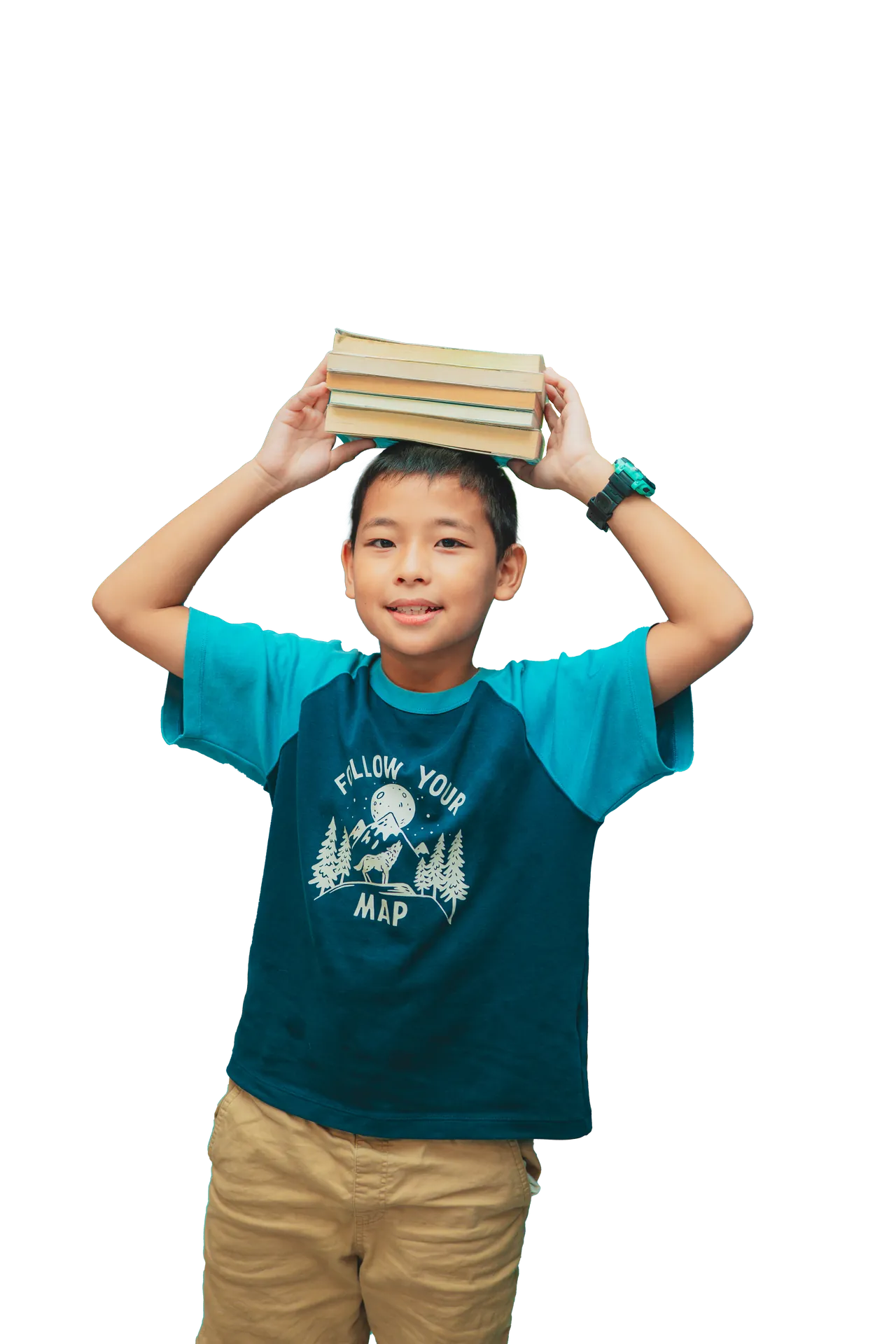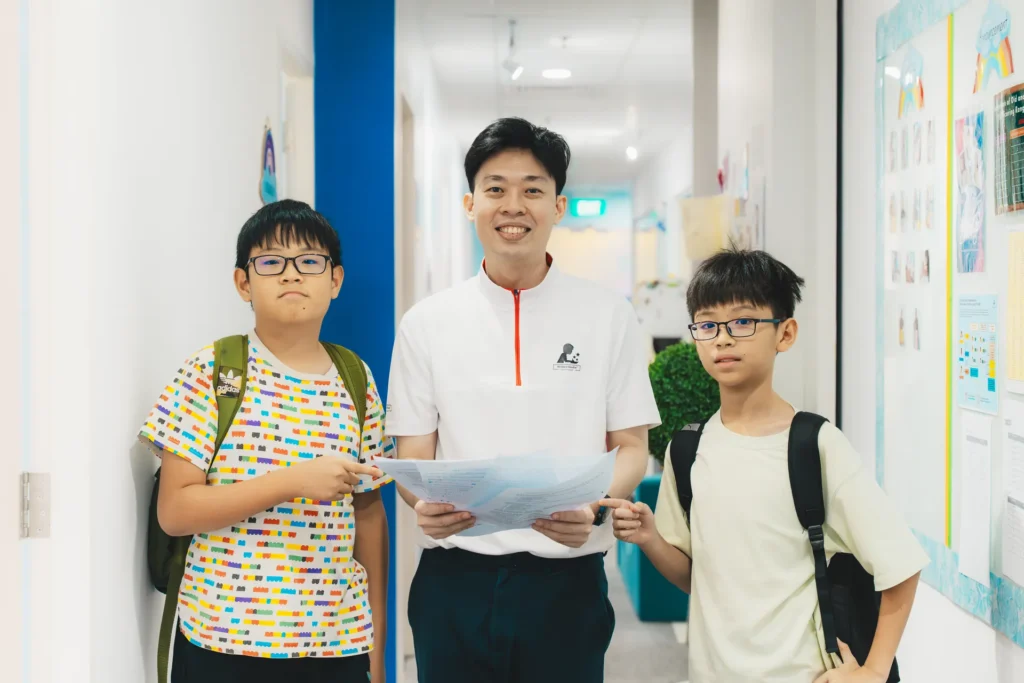Starbright (P3–P6)
For Primary 3 to 6 Students | Creative Writing | MOE-aligned


A good composition is more than a series of well-written sentences. It is a story that engages the reader clearly and connects with them emotionally. In our Starbright Programme, students are not asked to memorise model compositions or templates. Instead, we help them build a strong foundation in writing techniques so they can approach any composition topic with confidence and originality.
Our MOE-trained English teachers help students understand what makes writing effective in both creative and exam contexts, strengthening their skills for PSLE English preparation and the transition to the secondary school grading system.

Furthermore, your child will be exposed to an exciting range of story archetypes and as a result, enhance their abilities to create new plots that stand out.
Your child won’t get lost or bored. Our programme builds vocabulary, writing strategies, and narrative techniques in stages, from P3 to P6.
No random worksheets here. Each activity focuses on a specific skill: characterisation, pacing, paragraphing, plot twists, and more.
Students are also introduced to our in-house Writer’s Arc framework, a simple yet powerful guide that helps them plan and organise their stories with coherence and creativity.
Students learn how to write stories that flow, with vivid scenes, natural dialogue, and emotional impact. We show them how to go beyond memorised phrases and bring their ideas to life.
They also learn to enhance their writing with figurative language, descriptive imagery, and subtle literary techniques that make their stories more expressive and memorable.
Every composition receives personalised, in-depth feedback from our teachers. We don’t just mark mistakes; we help students improve.
Many Starbright students also use their writing portfolios for DSA applications, showcasing their creativity and growth through the programme.
Each month, students explore new writing themes, targeted Paper 2 modules, and oral communication practice. Lessons progress in complexity from P3–P4 (building structure and creativity) to P5–P6 (exam readiness and critical expression).
Lessons are organised into structured modules that balance focused skill instruction with independent writing practice and guided feedback, ensuring steady, measurable progress each term.
👩🏫 Group and 1-to-1 options available.
📍 Let your child discover the joy of writing — and score higher in the process.
For many students, the transition from the early primary years to formal composition writing can be challenging. Having been encouraged to write freely and creatively in the lower levels, they may find it discouraging when their writing is suddenly graded or judged by exam rubrics.
In the middle years, our lessons aim to preserve students’ enjoyment of writing while guiding them to understand what makes a composition effective when they are asked to in school. We continue to nurture creativity but also introduce structure and focus, through helping students recognise that strong writing is not about dramatic plots or “Hollywood-style” stories, but about clear expression and thoughtful focus.
As students enter the upper primary levels, they are expected to demonstrate greater linguistic precision and emotional maturity in their writing. The assessment rubrics also become more differentiated, requiring students to show nuanced understanding of content, organisation, and language.
Our upper-year curriculum builds on skills developed in earlier stages while introducing techniques for deeper narrative development and emotional resonance. Students learn to refine the writer’s voice, create more layered characters, and structure their stories in ways that engage and move the reader. This helps to prepare them not only for the PSLE English Paper 1 but also for longer-term success in secondary school writing.
1. About Our Classes
Each lesson runs for 2 hours. The first 45 minutes focuses on pre-writing activities such as:
After a short break, students spend about 10 minutes planning their story outline and the second hour on their writing task. Most weeks, they complete a full-length composition within 50 minutes, mirroring PSLE English Paper 1 exam conditions.
Students should bring the following for every lesson:
Bringing these materials helps lessons run smoothly and encourages students to take responsibility for their learning.
Our classes are typically capped at six students, allowing our teachers to provide focused attention and personalised feedback during writing and review time.
2. Curriculum and Learning Approach
While school lessons often emphasise exam results, our creative writing course explores the why and how behind effective storytelling. Techniques such as “Show, Not Tell” and narrative flow are taught in greater depth than most mainstream primary schools, helping students become confident and expressive writers.
This approach bridges creative writing and PSLE English preparation, equipping students to handle composition topics with both structure and insight.
Teachers may occasionally assign short tasks or Writer’s Journal updates at their discretion. Assignments are tailored to class needs rather than given by default.
Our lessons are designed to be self-contained and students complete full compositions in class under guided supervision. We understand that many students already have full schedules, so there is generally no compulsory homework beyond what is done in class.
Teachers provide feedback and corrections on all written work. Draft 2s are occasionally required as part of the lesson focus. Teachers may also request additional revisions for selected students, depending on learning needs.
The Writer’s Journal is a key part of our programme. Students use it to record useful expressions, Show Not Tell examples, and vocabulary introduced during lessons. It also includes a reference guide to the Writer’s Arc, a framework we teach to our students for them to structure their stories.
When used consistently, it becomes a personalised writing handbook and an excellent tool for composition revision.
3. Assessment and Progress
While we do not conduct formal exams, teachers monitor each student’s progress through weekly writing performance and qualitative feedback.
Once a month, one lesson is designated as an assessment week, during which students’ compositions are graded with an expanded rubric aligned with the PSLE grading approach. This provides a clear view of their current standing and areas for growth.
Feedback is provided through written marking, in-class discussions, and weekly updates on the class’s Google Classroom page. Parents receive access upon registration.
Teachers may also contact parents directly to highlight progress or concerns. Parents are welcome to request individual updates at term intervals or whenever clarification is needed.
4. Attendance and Logistics
All classes across our education centre move at the same pace weekly. If your child is unable to attend a class, they must attend a makeup lesson in the same week to stay aligned with the ongoing curriculum.
For extended absences, makeups can be arranged in a different programme so your child continues learning new content without repetition.
Each student receives two files upon registration:
Filing is an essential part of our primary school English tuition structure. Teachers conduct file checks regularly to ensure students’ work is organised and complete. Parents are encouraged to review the ring file periodically as it serves as a tangible record of your child’s writing progress and consistency.
New ring files can be requested each term. If you or your child are unsure about what to file, please check with the teacher directly.
5. Additional Information
Our Starbright Programme develops both creativity and writing structure, ensuring our students are well-prepared for the PSLE English Paper 1 and beyond. By the upper primary levels, students learn to demonstrate linguistic precision and emotional maturity, which are skills that directly contribute to a lower PSLE AL score and smoother transition to the grading system in secondary schools.
Our lessons are taught by ex-MOE teachers and MOE-trained English teachers with experience in PSLE English preparation, ensuring that students are supported by educators who understand exam requirements and language development holistically.